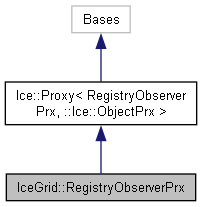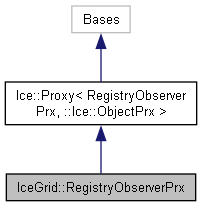This interface allows applications to monitor changes the state of the registry.
More...
|
| void | registryDown (const ::std::string &name, const ::Ice::Context &context=::Ice::noExplicitContext) |
| | The nodeDown operation is called to notify an observer that a node went down. More...
|
| |
| ::std::function< void()> | registryDownAsync (const ::std::string &name, ::std::function< void()> response, ::std::function< void(::std::exception_ptr)> ex=nullptr, ::std::function< void(bool)> sent=nullptr, const ::Ice::Context &context=::Ice::noExplicitContext) |
| | The nodeDown operation is called to notify an observer that a node went down. More...
|
| |
| template<template< typename > class P = ::std::promise> |
| auto | registryDownAsync (const ::std::string &name, const ::Ice::Context &context=::Ice::noExplicitContext) -> decltype(::std::declval< P< void >>().get_future()) |
| | The nodeDown operation is called to notify an observer that a node went down. More...
|
| |
| void | registryInit (const RegistryInfoSeq ®istries, const ::Ice::Context &context=::Ice::noExplicitContext) |
| | The registryInit operation is called after registration of an observer to indicate the state of the registries. More...
|
| |
| ::std::function< void()> | registryInitAsync (const RegistryInfoSeq ®istries, ::std::function< void()> response, ::std::function< void(::std::exception_ptr)> ex=nullptr, ::std::function< void(bool)> sent=nullptr, const ::Ice::Context &context=::Ice::noExplicitContext) |
| | The registryInit operation is called after registration of an observer to indicate the state of the registries. More...
|
| |
| template<template< typename > class P = ::std::promise> |
| auto | registryInitAsync (const RegistryInfoSeq ®istries, const ::Ice::Context &context=::Ice::noExplicitContext) -> decltype(::std::declval< P< void >>().get_future()) |
| | The registryInit operation is called after registration of an observer to indicate the state of the registries. More...
|
| |
| void | registryUp (const RegistryInfo &node, const ::Ice::Context &context=::Ice::noExplicitContext) |
| | The nodeUp operation is called to notify an observer that a node came up. More...
|
| |
| ::std::function< void()> | registryUpAsync (const RegistryInfo &node, ::std::function< void()> response, ::std::function< void(::std::exception_ptr)> ex=nullptr, ::std::function< void(bool)> sent=nullptr, const ::Ice::Context &context=::Ice::noExplicitContext) |
| | The nodeUp operation is called to notify an observer that a node came up. More...
|
| |
| template<template< typename > class P = ::std::promise> |
| auto | registryUpAsync (const RegistryInfo &node, const ::Ice::Context &context=::Ice::noExplicitContext) -> decltype(::std::declval< P< void >>().get_future()) |
| | The nodeUp operation is called to notify an observer that a node came up. More...
|
| |
| ::std::shared_ptr< RegistryObserverPrx > | ice_adapterId (const ::std::string &id) const |
| | Obtains a proxy that is identical to this proxy, except for the adapter ID. More...
|
| |
| ::std::shared_ptr< RegistryObserverPrx > | ice_batchDatagram () const |
| | Obtains a proxy that is identical to this proxy, but uses batch datagram invocations. More...
|
| |
| ::std::shared_ptr< RegistryObserverPrx > | ice_batchOneway () const |
| | Obtains a proxy that is identical to this proxy, but uses batch oneway invocations. More...
|
| |
| ::std::shared_ptr< RegistryObserverPrx > | ice_collocationOptimized (bool b) const |
| | Obtains a proxy that is identical to this proxy, except for collocation optimization. More...
|
| |
| ::std::shared_ptr< RegistryObserverPrx > | ice_compress (bool b) const |
| | Obtains a proxy that is identical to this proxy, except for its compression setting which overrides the compression setting from the proxy endpoints. More...
|
| |
| ::std::shared_ptr< RegistryObserverPrx > | ice_connectionCached (bool b) const |
| | Obtains a proxy that is identical to this proxy, except for connection caching. More...
|
| |
| ::std::shared_ptr< RegistryObserverPrx > | ice_connectionId (const ::std::string &id) const |
| | Obtains a proxy that is identical to this proxy, except for its connection ID. More...
|
| |
| ::std::shared_ptr< RegistryObserverPrx > | ice_context (const ::Ice::Context &context) const |
| | Obtains a proxy that is identical to this proxy, except for the per-proxy context. More...
|
| |
| ::std::shared_ptr< RegistryObserverPrx > | ice_datagram () const |
| | Obtains a proxy that is identical to this proxy, but uses datagram invocations. More...
|
| |
| ::std::shared_ptr< RegistryObserverPrx > | ice_encodingVersion (const ::Ice::EncodingVersion &version) const |
| | Obtains a proxy that is identical to this proxy, except for the encoding used to marshal parameters. More...
|
| |
| ::std::shared_ptr< RegistryObserverPrx > | ice_endpoints (const ::Ice::EndpointSeq &endpoints) const |
| | Obtains a proxy that is identical to this proxy, except for the endpoints. More...
|
| |
| ::std::shared_ptr< RegistryObserverPrx > | ice_endpointSelection (::Ice::EndpointSelectionType type) const |
| | Obtains a proxy that is identical to this proxy, except for the endpoint selection policy. More...
|
| |
| ::std::shared_ptr< RegistryObserverPrx > | ice_fixed (const ::std::shared_ptr<::Ice::Connection > &connection) const |
| | Obtains a proxy that is identical to this proxy, except it's a fixed proxy bound the given connection. More...
|
| |
| ::std::shared_ptr< RegistryObserverPrx > | ice_invocationTimeout (int timeout) const |
| | Obtains a proxy that is identical to this proxy, except for the invocation timeout. More...
|
| |
| ::std::shared_ptr< RegistryObserverPrx > | ice_locator (const ::std::shared_ptr<::Ice::LocatorPrx > &locator) const |
| | Obtains a proxy that is identical to this proxy, except for the locator. More...
|
| |
| ::std::shared_ptr< RegistryObserverPrx > | ice_locatorCacheTimeout (int timeout) const |
| | Obtains a proxy that is identical to this proxy, except for the locator cache timeout. More...
|
| |
| ::std::shared_ptr< RegistryObserverPrx > | ice_oneway () const |
| | Obtains a proxy that is identical to this proxy, but uses oneway invocations. More...
|
| |
| ::std::shared_ptr< RegistryObserverPrx > | ice_preferSecure (bool b) const |
| | Obtains a proxy that is identical to this proxy, except for its endpoint selection policy. More...
|
| |
| ::std::shared_ptr< RegistryObserverPrx > | ice_router (const ::std::shared_ptr<::Ice::RouterPrx > &router) const |
| | Obtains a proxy that is identical to this proxy, except for the router. More...
|
| |
| ::std::shared_ptr< RegistryObserverPrx > | ice_secure (bool b) const |
| | Obtains a proxy that is identical to this proxy, except for how it selects endpoints. More...
|
| |
| ::std::shared_ptr< RegistryObserverPrx > | ice_timeout (int timeout) const |
| | Obtains a proxy that is identical to this proxy, except for its connection timeout setting which overrides the timeot setting from the proxy endpoints. More...
|
| |
| ::std::shared_ptr< RegistryObserverPrx > | ice_twoway () const |
| | Obtains a proxy that is identical to this proxy, but uses twoway invocations. More...
|
| |
This interface allows applications to monitor changes the state of the registry.


 Public Member Functions inherited from Ice::Proxy< RegistryObserverPrx, ::Ice::ObjectPrx >
Public Member Functions inherited from Ice::Proxy< RegistryObserverPrx, ::Ice::ObjectPrx >